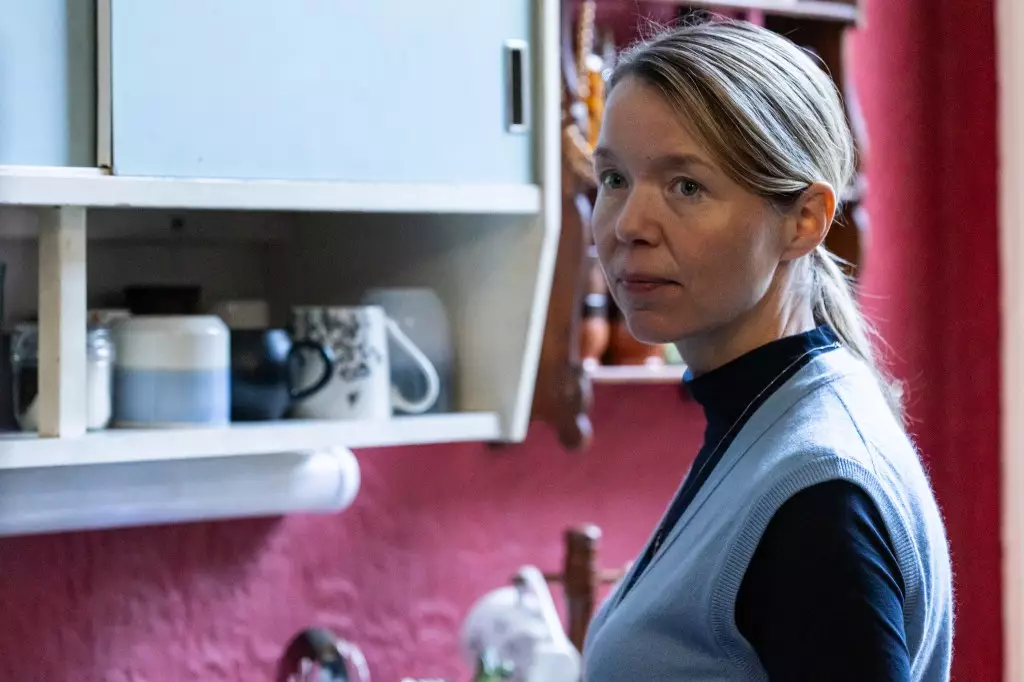British television often presents stories as moral battlegrounds where justice is served and redemption is inevitable. Yet, behind the glossy portrayals and compelling performances lies a deeper failure to confront the systemic flaws that perpetuate cycles of abuse and neglect. The recent BBC drama “Unforgivable,” scripted by the esteemed Jimmy McGovern, exemplifies this tendency. While it ostensibly offers a granular exploration of sexual abuse, therapy, and trauma, it inadvertently romanticizes the process of redemption, suggesting that rehabilitation alone can mend broken lives. This oversimplification risks disguising the complex social, institutional, and cultural failures that enable abuse to flourish unchecked.
Anna Maxwell-Martin’s portrayal of a therapist within the institution echoes the often simplistic depiction of “solutions” to deeply entrenched problems. Therapy, while valuable, cannot serve as the panacea that cures systemic neglect. When narratives overshadow the importance of structural reform with individual stories of resilience, they muddy the waters of accountability. Society should hold institutions—educational, religious, and governmental—culpable for their often negligent roles. Instead, these stories tend to focus on individual journeys, creating a false dichotomy where victims must individually confront their pain, rather than tackling the wider societal complicities that allowed the abuse to occur.
The Risk of Glorifying the Myth of Personal Redemption
Drama creators frequently risk elevating personal resilience above collective responsibility. In “Unforgivable,” the focus on characters like Joe (Bobby Schofield) and his sister (Anna Friel) may tug at viewers’ heartstrings, but it also subtly trivializes the broader social failures. By emphasizing individual stories of healing, the narrative can unintentionally suggest that victims can—if only they try hard enough—overcome systemic failures. It’s a dangerous narrative that shifts responsibility away from institutions that should be held to account.
The portrayal of therapy sessions and personal confrontations, while crucial, can foster a naive belief that trauma can simply be “worked through” without demanding profound societal change. This creates a false hope that individuals, rather than institutions, are the primary agents of justice. It’s a problematic perspective because it undermines the urgency for reform and perpetuates the idea that victims are responsible for their own healing, rather than recognizing the need for systemic overhaul and accountability.
The Cultural Limitations of Britain’s Liberal Response
From a center-liberal perspective, the challenge lies in balancing empathy with a critical understanding of societal failings. British media often headlines stories involving abuse and trauma, but rarely does it confront the underlying societal issues that enable such traumas to persist—poverty, institutional corruption, lack of oversight, and cultural taboos.
Too often, the focus remains on individual protagonists and their personal struggles, which, while emotionally compelling, overshadow collective efforts to prevent abuse and ensure justice. A truly progressive response requires embracing structural reforms alongside compassionate storytelling. It involves scrutinizing policies that protect institutions rather than victims—be it the church, schools, or law enforcement—and advocating for policies that prioritize victims’ rights and societal accountability.
The liberal center has a responsibility to challenge the entertainment industry’s tendency to favor simplistic narratives of redemption that risk absolving institutions of responsibility. Society should demand stories that confront uncomfortable truths about how systemic failures allow abuse to happen in the first place, instead of just individual stories of resilience that may inadvertently perpetuate a myth of personal salvation.
The Power of Responsible Storytelling
While storytelling tools are powerful and necessary for societal reflection, there is a profound ethical obligation to avoid perpetuating damaging myths. Television dramas like “Unforgivable” must operate with a nuanced awareness that their representations influence public perceptions of justice, accountability, and societal responsibility.
Instead of glorifying individual redemption, media should highlight the critical importance of societal reform. This includes exposing how institutions’ negligence fosters environments where abuse can occur, and how collective action and systemic change are vital for true justice. Creators should challenge audiences to consider questions of accountability—are we merely comforted by stories of personal resilience, or are we compelled to question and reform the very systems that enable such tragedies?
The challenge is to craft narratives that inspire not just empathy, but also critical engagement with the societal frameworks that shape our realities. Only by refusing to accept sanitized stories of personal salvation can we hope to foster a more honest, just, and accountable society.


Leave a Reply